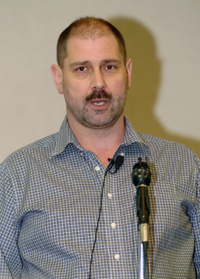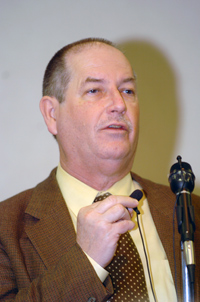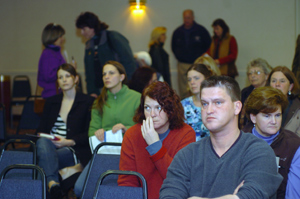Hundreds of concerned horse owners gathered at the Best Western hotel in Leesburg, Va., on the evening of Feb. 26 to hear the latest information on the EHV-1 outbreak that has left 10 premises quarantined in four counties in Virginia and 13 premises quarantined in six counties in Maryland.
So far only one horse has died of the neurological herpes virus—a horse that originated in Fauquier County, Va., went to the Marion duPont Scott Equine Medical Center and was later euthanized at a convalescent center in Harford County, Md. This is the only positive case of EHV-1 so far in Maryland. Maryland State Veterinarian Guy Hohenhaus reported that 40 to 50 tests had been sent to the Kentucky Department of Agriculture Laboratory.
 “The bad news is that we have one property in Maryland that had a confirmed case,” said Hohenhaus (pictured left). “We’re still waiting for quite a few more test results. If we get negative tests back on these primarily discharged patients, and everything goes well and according to our protocol, then we hope to release some additional properties in the next 24 to 36 hours. As of this evening, we’ve released, unconditionally, one property in Montgomery County.”
“The bad news is that we have one property in Maryland that had a confirmed case,” said Hohenhaus (pictured left). “We’re still waiting for quite a few more test results. If we get negative tests back on these primarily discharged patients, and everything goes well and according to our protocol, then we hope to release some additional properties in the next 24 to 36 hours. As of this evening, we’ve released, unconditionally, one property in Montgomery County.”
Tests results should come in any day for four horses displaying herpes virus symptoms on quarantined farms in Virginia. Two of these horses are displaying neurological symptoms but are recovering.
Virginia State Veterinarian Richard Wilkes put to rest some scary rumors that had been circulating. The Virginia borders aren’t closed to horses traveling in and out, and there’s no plan to do so. Wilkes did cancel two events, the Casanova Hunt Point-to-Point and the Casanova Hunter Pace in Fauquier County last weekend because the event grounds were in close proximity to a farm quarantined because of EHV-1. At this point, he’s not cancelled any other equine events in Virginia. 
“We did reach out to the horse industry and ask all of you and your event managers to consider some voluntary cancellations, and you’ve responded accordingly,” said Wilkes (pictured right). “I thank you for that. I know it was not an easy decision for many of you.”
The Master of Foxhounds Association leadership responded by canceling the Virginia and Maryland hunts for the time being.
ADVERTISEMENT
This outbreak of EHV-1 originated at the Marion duPont Scott Equine Medical Center in Leesburg, Va., and veterinarians from the medical center reviewed the timeline of the disease, discussed their current status and explained the plan for eventually reopening the facility.
The index horse arrived at the medical center on Feb. 7 for colic surgery. On Feb. 11, he began to exhibit signs of fever and neurological symptoms, but initial test results indicated meningitis. The horse was placed in isolation, and on Feb. 16 test results returned positive for EHV-1. On Feb. 18, another horse developed a fever, and at that point the medical center staff set up bio-security perimeters and began contacting the owners of horses who had been in or out of the medical center on or after Feb. 7.
On Feb. 19, they closed the hospital, took blood and nasal swabs from all of the horses and continued trying to track down any horses that might have come in contact with the index horse. By Feb. 20, two more horses at the medical center began to exhibit neurological symptoms. Horses remaining at the medical center were divided into four separate locations with separate staff attending them. Only the four horses in the isolation unit have so far shown neurological symptoms, and the index horse suffered the most severe signs, but all of them are recovering.
Two horses so far have tested positive for EHV-1 at the medical center, and veterinarians are awaiting test results on the two others that displayed neurological symptoms.
The exit plan for the medical center includes testing for EHV-1 12 days after the last fever is recorded. Veterinarians will conduct daily testing on all of the horses, and when three consecutive tests spaced 24 hours apart come back negative for all of the horses, then they’ll begin the process of releasing them.
The hospital will reopen once all of the current patients test negative and are dismissed from the facility.
 “Basically, we won’t open until I’m happy to bring my horse to the medical center,” said Nathaniel A. White, II, DVM, MS, and director at the Marion duPont Scott Equine Medical Center. White (pictured left) encouraged people with questions to call the medical center hotline at 1-866-438-7235 from 9 a.m. to 5 p.m. on Monday through Friday and from 9 a.m. to noon on Saturday.
“Basically, we won’t open until I’m happy to bring my horse to the medical center,” said Nathaniel A. White, II, DVM, MS, and director at the Marion duPont Scott Equine Medical Center. White (pictured left) encouraged people with questions to call the medical center hotline at 1-866-438-7235 from 9 a.m. to 5 p.m. on Monday through Friday and from 9 a.m. to noon on Saturday.
ADVERTISEMENT
The veterinarians present assured people that this occurrence of EHV-1 has no known connection with the earlier outbreak in Florida this year. They reiterated the fact that there’s no vaccine that prevents horses from developing the neurological strain of the herpes virus and confirmed that this neurological form is a mutated virus that’s more virulent and more commonly seen today than in the past.
Many people pressed the state veterinarians for the names of the quarantined facilities and were angry that they wouldn’t release them. “Confidentiality is not a vast government conspiracy,” assured Hohenhaus. He explained that most quarantined facilities will end up with no cases of EHV-1, but once they’d been labeled, their reputations might suffer.
“We need people to report, to call their veterinarian when something is wrong,” said Hohenhaus. “If the result is a destroyed reputation, then you give them a powerful reason not to report.”
Bio-security was stressed throughout the meeting for the average horse owner. EHV-1 is easily killed by most common detergents, including bleach. Simply throwing clothes in the washing machine, dipping tools in disinfectant and keeping other items generally clean greatly reduces the risk of spreading the virus through humans. While feed trucks weren’t considered a big threat, Wilkes did suggest that equine dentists might refrain from practicing in the Virginia and Maryland area for 10 days.
Farriers and veterinarians should change clothes between farms, disinfect footwear and tools and, most importantly, wash their hands thoroughly to reduce the risk of spreading the virus. For more information on bio-security, go to www.vdacs.virginia.gov/animals/pdf/ehv-infosheet.pdf.


Concerned horse owners from the Northern Virginia area crowded into a meeting room at the Best Western Hotel in Leesburg, Va. to discuss EHV-1.
Listen to sound bytes of Maryland State Veterinarian Guy Hohenhaus and Virginia State Veterinarian Richard Wilkes.














